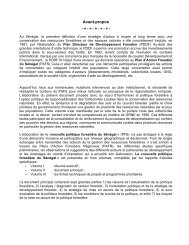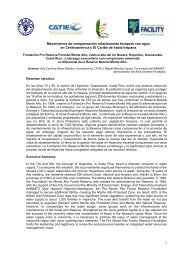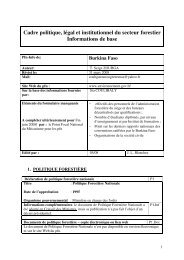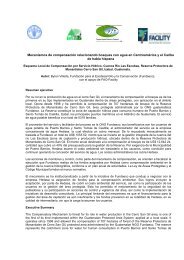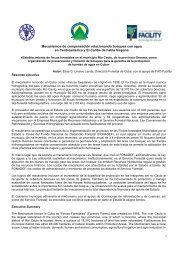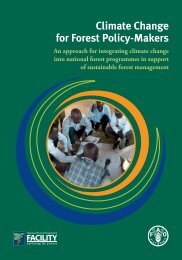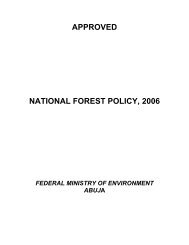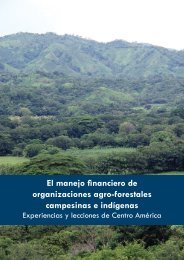2010 Progress Report â Draft - NFP Facility
2010 Progress Report â Draft - NFP Facility
2010 Progress Report â Draft - NFP Facility
You also want an ePaper? Increase the reach of your titles
YUMPU automatically turns print PDFs into web optimized ePapers that Google loves.
<strong>2010</strong> <strong>Progress</strong> <strong>Report</strong><strong>Facility</strong> support to National Forest Financing StrategiesIn a number of partner countries, the <strong>Facility</strong>, in close collaboration with FAO and other partners, has providedfurther support in <strong>2010</strong> to the development of National Forest Financing Strategies (NFFS) and selectedfinancing instruments. The purpose of this support is to encourage and guarantee the active participation offorest and financial stakeholders in the process of discussing, elaborating and implementing the NFFS, as a toolfor strengthen nfp implementation. Some of the key activities and achievements are presented below.In Guatemala, the most significant achievement was the passage by the National Congress, (on 17 November<strong>2010</strong>), of the “PINPEP law”, decree 51-<strong>2010</strong>, that provides incentives to small forest holders with areas of lessthan 15 hectares for forestry activities. The incentives will be financed through an annual allocation of about0.5% of the national public operations budget. It is expected that over 400,000 people will directly benefit fromthis publicly supported incentive scheme. This achievement, among other things, speaks to the power ofimproving sector governance and strengthening the organization of small producers.In Guatemala, support was also provided through the analysis of investment opportunities for the use of woodresidues generated from forest harvesting and wood processing mills. Potential options for the use of biomass asan energy source and an overview of its contribution to climate change mitigation were presented. A briefanalysis showed that if all currently generated wood residues were utilized for electricity generation, the countrycould save up to US$ 150 million annually, through the replacement of fossil fuels. This would translate into anadditional US$ 7 million through the sale of certificate emissions reductions (CERs).In Paraguay, thanks to a dialogue between forest and finance representatives that started in 2009, the AgenciaFinanciera de Desarrollo (AFD), a public development bank, launched in <strong>2010</strong> a US$2 million credit line(PROFORESTAL) for planting activities.In Uganda, mutual learning is taking place between the forest and finance sectors. This process is helping toidentify key forest finance instruments (e.g., the Tree Fund) and ensure greater involvement of foreststakeholders in the budget process, as well as in discussions about governance reform.In the Asia and Pacific Region, the <strong>Facility</strong> has actively supported the development of a project proposal to assistpartner countries to augment resources for financing SFM. The proposal, which has emerged from various FAOtechnical inputs, close collaboration with other development partners, and strong regional ownership, identifiedthe need for developing comprehensive national forest financing strategies. During 2011, the <strong>Facility</strong> will supportthe development of these strategies in three countries in the region, in addition to helping to implement some ofthe forest financing activities identified at the regional level.In West Africa, forests are critical to supporting the livelihoods of millions of local people; yet the absence ofadequate and readily accessible finance often threatens their sustainable management. This is particularlychallenging to small and community forestry initiatives which play an important role in rural development andpoverty alleviation in the region. While there have been some attempts to improve the situation, the informationon them is scattered and countries lack comprehensive national forest financing strategies. In response to thisneed, the <strong>Facility</strong>, in collaboration with FAO and GFP, have launched an initiative to facilitate an exchange ofexperiences on existing and innovative financing mechanisms and to devise plans to further strengthen forestfinancing in the region. As a major step in this direction, a regional planning and knowledge-sharing workshopfor the countries in the ECOWAS region is being organized in Monrovia, Liberia, on 22 and 23 March 2011. Thisinitiative will ultimately lead to the development of practical, applicable, and sustainable financial mechanisms inresponse to the challenges and opportunities identified for small holders and community forestry stakeholders.A similar initiate is ongoing in Central America (see next page).20



